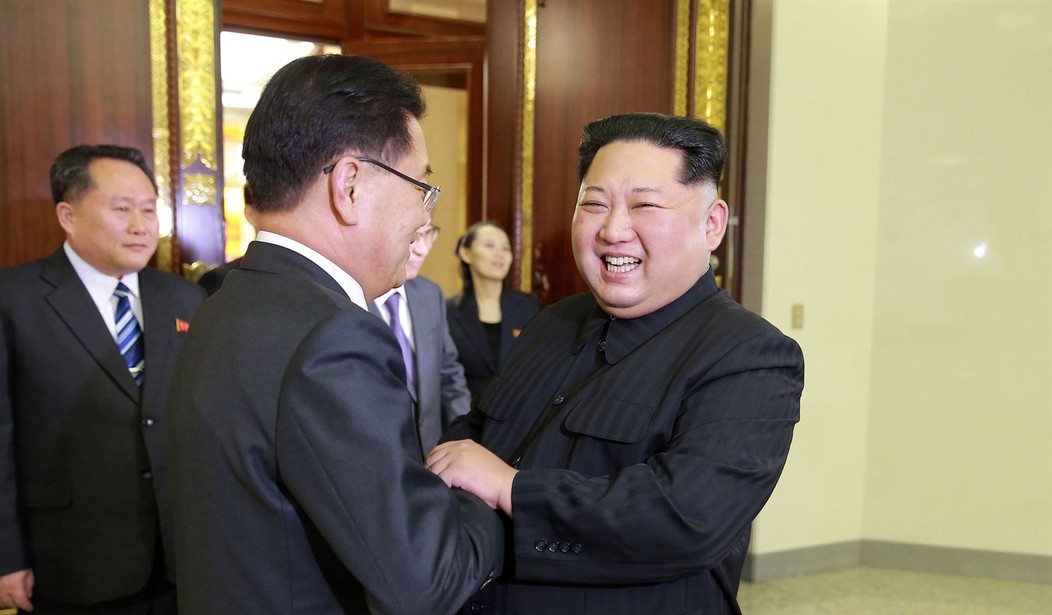Now that President Trump has accepted Kim Jong Un’s invitation to meet, it is worth remembering the events of October 11th and 12th of 1986 when Ronald Reagan and the leader of the Soviet Union, Mikael Gorbachev, met at a summit meeting in Reykjavik Iceland. Reagan came to the meeting to negotiate for greater human rights within the Soviet Empire, a cessation of the war in Afghanistan as well as arms control. Gorbachev tried desperately to limit the negotiations to arms control and offered a dramatic 50% reduction of all strategic arms. But he had a secret agenda. He came to the meeting hoping to convince Reagan to scrap America’s embryonic missile defense program then called the Strategic Defense Initiative (SDI).
Reagan countered Gorbachev’s 50% with an offer to reduce all intercontinental ballistic missiles over ten years. Gorbachev agreed to enter discussions relative to the 100% reduction if Reagan would end SDI. Reagan’s expression turned to anger. He replied,“Nyet!” To the dismay of his closest advisors, Reagan promptly brought the summit to a close exited the room.
Almost exactly three years later, on November 9, 1989, the Berlin wall came down and the Soviet Union collapsed. Gorbachev recorded in his memoirs at that very moment, he knew the Soviet Union was doomed because its ailing command economy could not begin to keep pace militarily with the U.S.
In my new book, Lessons from Fallen Civilizations, Vol. II, I chronicle the feckless ineptitude of American foreign policy over the eight Obama years which, among its many failures, enabled the virulently anti-Western rogue regimes of North Korea and Iran to ally with Russia and China, thus forming what I call the “New Axis of Evil.”
To be fair to the previous administration, the last four presidents, Bush, Clinton, Bush, and Obama all kicked the North Korean can down the road, naively believing that various mixtures of diplomacy, bribery, and weak sanctions could dissuade the Kim dynasty from achieving its long-sought goal of possessing nuclear weapons deliverable upon intercontinental ballistic missiles. Unfortunately for Trump and us, there is no more road down which to kick the Korean can. CIA Director, Mike Pompeo, said in January, within a handful of months, Pyongyang will be able to target U.S. cities.
Recommended
Despite what seemed thawing of the crisis, occasioned by the South Koreans’ hosting of the Winter Olympics, the Chinese now appear to be aggressively cooperating with the U.S. in its operation dubbed “maximum pressure” which, according to Vice President Pence and others, encompasses the most aggressive sanctions ever imposed on North Korea.
A cadre of brave Wall Street Journal reporters recently traveled to the far north of North Korea, to a remote area which borders both China and Russia. They found that trade between North Korea and its largest trading partner and benefactor, China, has come to a near halt.
Near the far-north North Korean city of Rason, at a check point on the Chinese border, the intrepid crew of WSJ reporters met a Chinese business man going to check on his equipment stuck in his garment factory there. His factory closed in November after China began enforcing the UN ban on North Korean exports. His plant shut down and terminated the jobs of 200 North Koreans who formerly sent half their pay checks to the government. The reporters found that there were more than a dozen garment factories like his that were shut down and found that thousands of other North Koreans in the seafood industry, whose factories were shuttered, had lost their jobs. They learned that Chinese border guards even stopped traders from allowing small personal allowances of personal cigarettes from leaving the North Korean prison state.
Chinese reports can be inaccurate, for example, its official published military expenditures are known to much less than they truly spend. Nevertheless, China is reporting that its imports from North Korea are now down 82% from a year earlier.
In short, while we don’t know the cause yet, something profound has recently changed in terms of Chinese behavior. Could it be that China is now working with the U.S. to collapse the Kim regime? Previously, China would vote in the U.N. or agree to impose sanctions and then aid and abet North Korea’s tactics to defeat those same sanctions. Up to now, East Asian experts concluded that it was part of China’s long-range strategy to protect and prop up a nuclear-armed puppet regime in North Korea. This served China in two important ways. One, by the Kim regimes threatening America, its allies, and the international waterways in the region, it might eventually convince the U.S. to abandon its military defense of the region, thus opening the vast area up to Chinese hegemony. Two, the quasi-Leninist rogue regime on its western border formed a necessary buffer between Communist China and the ultra-capitalist South Korea.
China cannot countenance a unified capitalist Korea sitting on its doorstep. Yet, could it be that the senior planners fear that a nuclear war erupting just across the Yalu River could have too great a catastrophic cost. And could it be that the Trump negotiation could be going on as follows: “China, you help us bring down the Kim Dynasty and we won’t object to your installing a new puppet…so long as he doesn’t have nukes.” Eventually, we’re going to find out what is motivating China.
























Join the conversation as a VIP Member